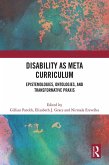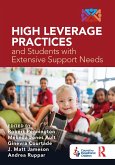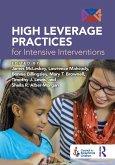High Leverage Practices and Students with Extensive Support Needs (eBook, PDF)
Redaktion: Pennington, Robert; Ruppar, Andrea; Jameson, J. Matt; Courtade, Ginevra; Ault, Melinda
28,95 €
28,95 €
inkl. MwSt.
Sofort per Download lieferbar

14 °P sammeln
28,95 €
Als Download kaufen

28,95 €
inkl. MwSt.
Sofort per Download lieferbar

14 °P sammeln
Jetzt verschenken
Alle Infos zum eBook verschenken
28,95 €
inkl. MwSt.
Sofort per Download lieferbar
Alle Infos zum eBook verschenken

14 °P sammeln
High Leverage Practices and Students with Extensive Support Needs (eBook, PDF)
Redaktion: Pennington, Robert; Ruppar, Andrea; Jameson, J. Matt; Courtade, Ginevra; Ault, Melinda
- Format: PDF
- Merkliste
- Auf die Merkliste
- Bewerten Bewerten
- Teilen
- Produkt teilen
- Produkterinnerung
- Produkterinnerung

Bitte loggen Sie sich zunächst in Ihr Kundenkonto ein oder registrieren Sie sich bei
bücher.de, um das eBook-Abo tolino select nutzen zu können.
Hier können Sie sich einloggen
Hier können Sie sich einloggen
Sie sind bereits eingeloggt. Klicken Sie auf 2. tolino select Abo, um fortzufahren.

Bitte loggen Sie sich zunächst in Ihr Kundenkonto ein oder registrieren Sie sich bei bücher.de, um das eBook-Abo tolino select nutzen zu können.
Building on the formative work of High Leverage Practices for Inclusive Classrooms , this critical companion explores how high leverage practices can be applied to the education of students with extensive support needs (ESN).
- Geräte: PC
- ohne Kopierschutz
- eBook Hilfe
- Größe: 14.78MB
Andere Kunden interessierten sich auch für
![Disability as Meta Curriculum (eBook, PDF) Disability as Meta Curriculum (eBook, PDF)]() Disability as Meta Curriculum (eBook, PDF)41,95 €
Disability as Meta Curriculum (eBook, PDF)41,95 €![High Leverage Practices and Students with Extensive Support Needs (eBook, ePUB) High Leverage Practices and Students with Extensive Support Needs (eBook, ePUB)]() High Leverage Practices and Students with Extensive Support Needs (eBook, ePUB)28,95 €
High Leverage Practices and Students with Extensive Support Needs (eBook, ePUB)28,95 €![High Leverage Practices for Intensive Interventions (eBook, PDF) High Leverage Practices for Intensive Interventions (eBook, PDF)]() High Leverage Practices for Intensive Interventions (eBook, PDF)30,95 €
High Leverage Practices for Intensive Interventions (eBook, PDF)30,95 €![Mindfulness for Students (eBook, PDF) Mindfulness for Students (eBook, PDF)]() Wendy FuchsMindfulness for Students (eBook, PDF)27,95 €
Wendy FuchsMindfulness for Students (eBook, PDF)27,95 €![Activating the Untapped Potential of Neurodiverse Learners in the Math Classroom (eBook, PDF) Activating the Untapped Potential of Neurodiverse Learners in the Math Classroom (eBook, PDF)]() David JohnstonActivating the Untapped Potential of Neurodiverse Learners in the Math Classroom (eBook, PDF)30,95 €
David JohnstonActivating the Untapped Potential of Neurodiverse Learners in the Math Classroom (eBook, PDF)30,95 €![A Struggle for Choice (eBook, PDF) A Struggle for Choice (eBook, PDF)]() Jenny CorbettA Struggle for Choice (eBook, PDF)103,95 €
Jenny CorbettA Struggle for Choice (eBook, PDF)103,95 €![Reaching and Teaching Students with Special Needs Through Art (eBook, PDF) Reaching and Teaching Students with Special Needs Through Art (eBook, PDF)]() Reaching and Teaching Students with Special Needs Through Art (eBook, PDF)66,95 €
Reaching and Teaching Students with Special Needs Through Art (eBook, PDF)66,95 €-
-
-
Building on the formative work of High Leverage Practices for Inclusive Classrooms, this critical companion explores how high leverage practices can be applied to the education of students with extensive support needs (ESN).
Dieser Download kann aus rechtlichen Gründen nur mit Rechnungsadresse in A, B, BG, CY, CZ, D, DK, EW, E, FIN, F, GR, HR, H, IRL, I, LT, L, LR, M, NL, PL, P, R, S, SLO, SK ausgeliefert werden.
Produktdetails
- Produktdetails
- Verlag: Taylor & Francis eBooks
- Seitenzahl: 276
- Erscheinungstermin: 21. November 2022
- Englisch
- ISBN-13: 9781000774016
- Artikelnr.: 66002143
- Verlag: Taylor & Francis eBooks
- Seitenzahl: 276
- Erscheinungstermin: 21. November 2022
- Englisch
- ISBN-13: 9781000774016
- Artikelnr.: 66002143
- Herstellerkennzeichnung Die Herstellerinformationen sind derzeit nicht verfügbar.
Robert Pennington is the Lake & Edward J. Snyder, Jr. Distinguished Professor in Special Education at University of North Carolina-Charlotte, USA. Melinda Jones Ault is a Professor at University of Kentucky, USA. Ginevra Courtade is a Professor at University of Louisville, USA. J. Matt Jameson is a Professor at University of Utah, USA. Andrea Ruppar is an Associate Professor at University of Wisconsin-Madison, USA.
1. Collaborate with Colleagues to Increase Student Success 2. Leading
Effective Meetings with Professionals and Families 3. Collaborate with
Families to Support Student Learning and Needed Services 4. Using Multiple
Sources of Information to Develop a Comprehensive Understanding of a
Student¿s Strengths and Needs 5. Interpreting and Communicating Assessment
Information with Stakeholders to Collaboratively Design and Implement
Educational Programs 6. Using Student Assessment Data, Analyzing
Instructional Packages, and Making Necessary Adjustments that Improve
Student Outcomes 7. Consistent, Organized, and Respectful Learning
Environment 8. Using Feedback to Improve Student Outcomes 9. Teaching
Social Skills 10. Conducting Functional Behavior Assessment to Develop
Individualized Behavior Support Plans 11. Identify and Prioritize Long- and
Short-term Learning Goals 12. Systematically Design Instruction toward a
Specific Learning Goal 13. Adapt Curriculum Tasks and Materials for
Specific Learning Goals 14. Teaching Cognitive and Meta Cognitive
Strategies to Support Learning and Independence 15. Providing Scaffolded
Supports 16. Providing Intensive Instruction and Using Explicit Instruction
17. Using Flexible Grouping 18. Use Strategies to Promote Active Engagement
19. Use Assistive and Instructional Technologies 20. Teach Students to
Maintain and Generalize New Learning Across Time and Settings 21. Providing
Positive and Corrective Feedback
Effective Meetings with Professionals and Families 3. Collaborate with
Families to Support Student Learning and Needed Services 4. Using Multiple
Sources of Information to Develop a Comprehensive Understanding of a
Student¿s Strengths and Needs 5. Interpreting and Communicating Assessment
Information with Stakeholders to Collaboratively Design and Implement
Educational Programs 6. Using Student Assessment Data, Analyzing
Instructional Packages, and Making Necessary Adjustments that Improve
Student Outcomes 7. Consistent, Organized, and Respectful Learning
Environment 8. Using Feedback to Improve Student Outcomes 9. Teaching
Social Skills 10. Conducting Functional Behavior Assessment to Develop
Individualized Behavior Support Plans 11. Identify and Prioritize Long- and
Short-term Learning Goals 12. Systematically Design Instruction toward a
Specific Learning Goal 13. Adapt Curriculum Tasks and Materials for
Specific Learning Goals 14. Teaching Cognitive and Meta Cognitive
Strategies to Support Learning and Independence 15. Providing Scaffolded
Supports 16. Providing Intensive Instruction and Using Explicit Instruction
17. Using Flexible Grouping 18. Use Strategies to Promote Active Engagement
19. Use Assistive and Instructional Technologies 20. Teach Students to
Maintain and Generalize New Learning Across Time and Settings 21. Providing
Positive and Corrective Feedback
1. Collaborate with Colleagues to Increase Student Success 2. Leading
Effective Meetings with Professionals and Families 3. Collaborate with
Families to Support Student Learning and Needed Services 4. Using Multiple
Sources of Information to Develop a Comprehensive Understanding of a
Student¿s Strengths and Needs 5. Interpreting and Communicating Assessment
Information with Stakeholders to Collaboratively Design and Implement
Educational Programs 6. Using Student Assessment Data, Analyzing
Instructional Packages, and Making Necessary Adjustments that Improve
Student Outcomes 7. Consistent, Organized, and Respectful Learning
Environment 8. Using Feedback to Improve Student Outcomes 9. Teaching
Social Skills 10. Conducting Functional Behavior Assessment to Develop
Individualized Behavior Support Plans 11. Identify and Prioritize Long- and
Short-term Learning Goals 12. Systematically Design Instruction toward a
Specific Learning Goal 13. Adapt Curriculum Tasks and Materials for
Specific Learning Goals 14. Teaching Cognitive and Meta Cognitive
Strategies to Support Learning and Independence 15. Providing Scaffolded
Supports 16. Providing Intensive Instruction and Using Explicit Instruction
17. Using Flexible Grouping 18. Use Strategies to Promote Active Engagement
19. Use Assistive and Instructional Technologies 20. Teach Students to
Maintain and Generalize New Learning Across Time and Settings 21. Providing
Positive and Corrective Feedback
Effective Meetings with Professionals and Families 3. Collaborate with
Families to Support Student Learning and Needed Services 4. Using Multiple
Sources of Information to Develop a Comprehensive Understanding of a
Student¿s Strengths and Needs 5. Interpreting and Communicating Assessment
Information with Stakeholders to Collaboratively Design and Implement
Educational Programs 6. Using Student Assessment Data, Analyzing
Instructional Packages, and Making Necessary Adjustments that Improve
Student Outcomes 7. Consistent, Organized, and Respectful Learning
Environment 8. Using Feedback to Improve Student Outcomes 9. Teaching
Social Skills 10. Conducting Functional Behavior Assessment to Develop
Individualized Behavior Support Plans 11. Identify and Prioritize Long- and
Short-term Learning Goals 12. Systematically Design Instruction toward a
Specific Learning Goal 13. Adapt Curriculum Tasks and Materials for
Specific Learning Goals 14. Teaching Cognitive and Meta Cognitive
Strategies to Support Learning and Independence 15. Providing Scaffolded
Supports 16. Providing Intensive Instruction and Using Explicit Instruction
17. Using Flexible Grouping 18. Use Strategies to Promote Active Engagement
19. Use Assistive and Instructional Technologies 20. Teach Students to
Maintain and Generalize New Learning Across Time and Settings 21. Providing
Positive and Corrective Feedback







